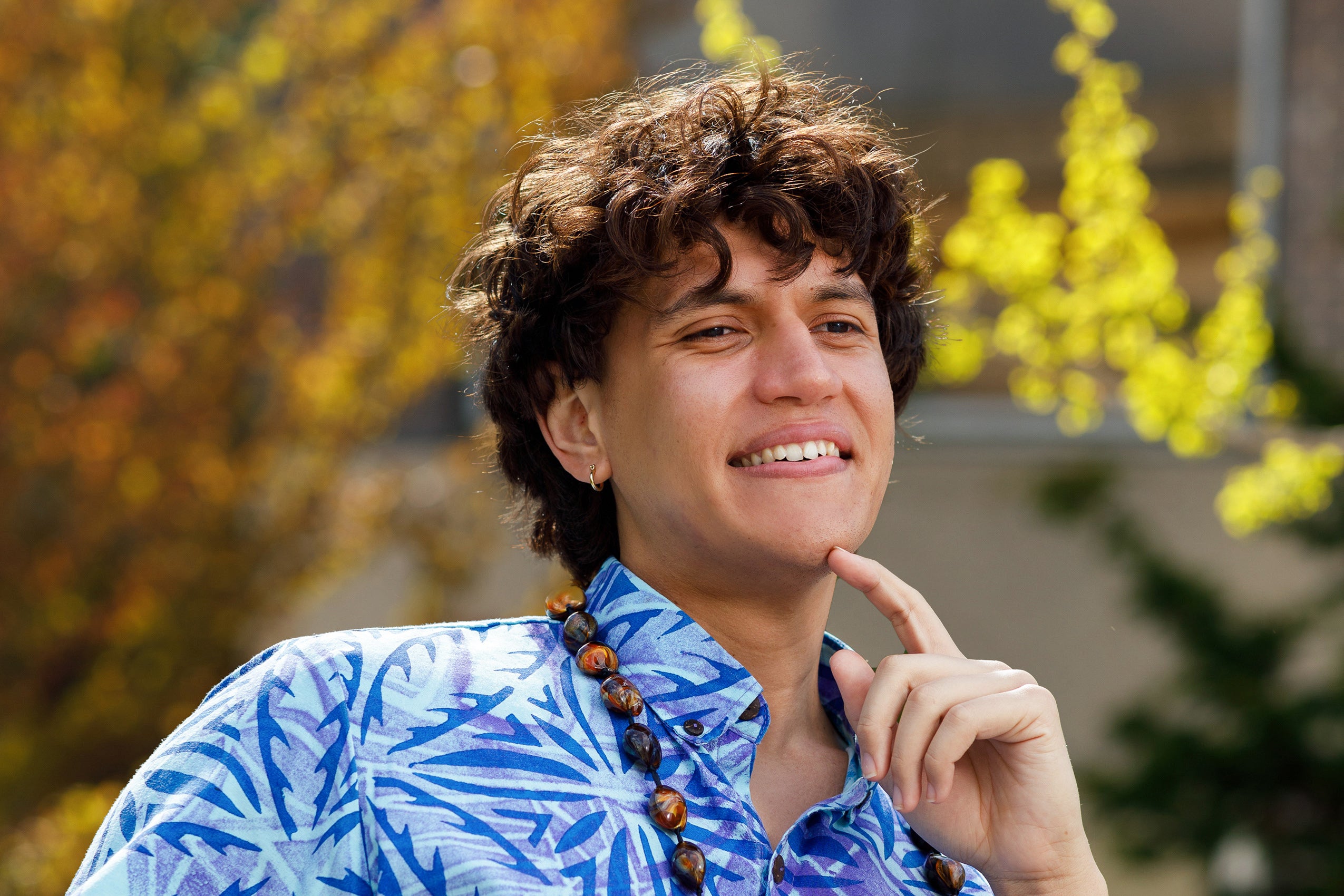For J.V. Langkilde ’22, it’s all about community.
“Growing up in American Samoa, I lived near a lot of family,” he says. “We had a plot of land where my mother and her children, her brother and his children, and their sister and their children, all lived. That’s pretty typical for Samoan families — we not only live near one another, but sometimes even have intergenerational, inter-familial households.”
Born in Hawaii and raised in American Samoa, Langkilde says his background, coupled with the Samoan emphasis on aiga — family — have instilled in him a deep appreciation for connection across people. It is this passion for building and fostering relationships that Langkilde says has defined much of his life — including his time as a student at Harvard Law School, from which he will graduate on May 26.
“It’s such an important element of Samoan culture, the importance of community, of helping others,” he says. “It shapes me to this day.”
One of Langkilde’s earliest networks came through sports. After high school, his talent for baseball took him to Utah, where he first played for Salt Lake Community College, and then worked for Brigham Young University’s team. He says the lessons he learned in baseball — critical thinking, analysis, and teamwork — were also things that drew him to the law.
“My mother is an attorney, and I grew up seeing the law as a vehicle for problem solving,” he says. “I was interested in it as a way to contribute to the community.”
“It’s such an important element of Samoan culture, the importance of community, of helping others. It shapes me to this day.”
Langkilde arrived at Harvard Law in the fall of 2019. As a first-year student, he found community in the Board of Student Advisers — a group of students who provide mentorship and serve as teaching assistants for the First Year Legal Research and Writing course. “As a 1L, I was a little unsure of myself and felt lost when navigating HLS, especially early on. My BSA was someone who was there for me in those moments of doubt,” he says. “They were a vital resource during my 1L year.”
Wanting to give back, Langkilde accepted an invitation to become a member of BSA the following year. He says he found fulfillment in offering support — academic and emotional — to incoming law students, and that the experience made him a better advocate in other ways, too. “It has taught me to listen, to trust that people know what they need, and to know that my role is to ask questions and be there to offer support as the other person deems appropriate. It’s also taught me that I want to be a resource for folks in my life after law school, as well.”
Learning remotely — from an ocean away
Langkilde’s strong emphasis on community explains why, when Harvard Law School shifted to remote classes at the end of his first year and into his second because of the Covid pandemic, moving home to American Samoa to study came with some unexpected benefits — despite a seven-hour time difference.
“It could be tough, but it was also great to be home and be surrounded by family,” he says, adding that he and friends from law school exchanged gifts through the mail to stay connected. “It was wonderful to be reminded of the strength of the community during a difficult time.”
Langkilde also appreciated the additional time with his younger brother and sister. “Being an older sibling to them is another thing that is very fulfilling to me in my life,” he says. “It’s something I very much cherish, and has influenced who I am.”
“We (Pacific Islanders) make up less than half a percent of all lawyers. A tiny, tiny percentage. I hope that by building more of a community here at HLS and at other law schools, we can increase that representation.”
As a student, Langkilde says he reveled in the variety of classes offered at Harvard Law, and particularly enjoyed courses on Indigenous and Indian Law. He says he is interested in the ways in which tribal and territorial sovereignty intersect — and sometimes clash — with the U.S. legal system. “I completed two independent writing credits on American Samoa during my time at HLS. My research and writing explored how Samoan culture interacts with Western legal schemes, such as the U.S. Constitution, and how Samoan culture survives, and thrives, in spite of that.”
This is also why Langkilde has volunteered his time to encourage students from the Pacific Island region to attend law school — whether at Harvard or otherwise. “We make up less than half a percent of all lawyers. A tiny, tiny percentage,” he says. “I hope that by building more of a community here at HLS and at other law schools, we can increase that representation.”
In his spare time, Langkilde says he enjoys playing basketball at Harvard’s Hemenway Gym with other law students. He also loves listening to Pacific Islander artists, like Laga Savea and J Boog. And although Cambridge is a long way from American Samoa, Langkilde has nonetheless been able to indulge his love of Polynesian cuisine. “There’s a local shop called Manoa Poke in Somerville – fantastic food,” he raves.
After graduation, Langkilde will join Latham & Watkins in Washington, D.C., where he says he is excited to explore the corporate firm’s many practice areas. Meanwhile, he says he will continue to find ways to support and uplift the people he cares about — on their terms.
“It’s very important for me to stay in touch with my community, and to touch base with the outcomes that my community needs and wants. In the coming years, I hope to find my role in supporting them and not rely on my own presumptions of what’s best for them,” he says. “Instead, I want to listen and try to be an advocate.”
